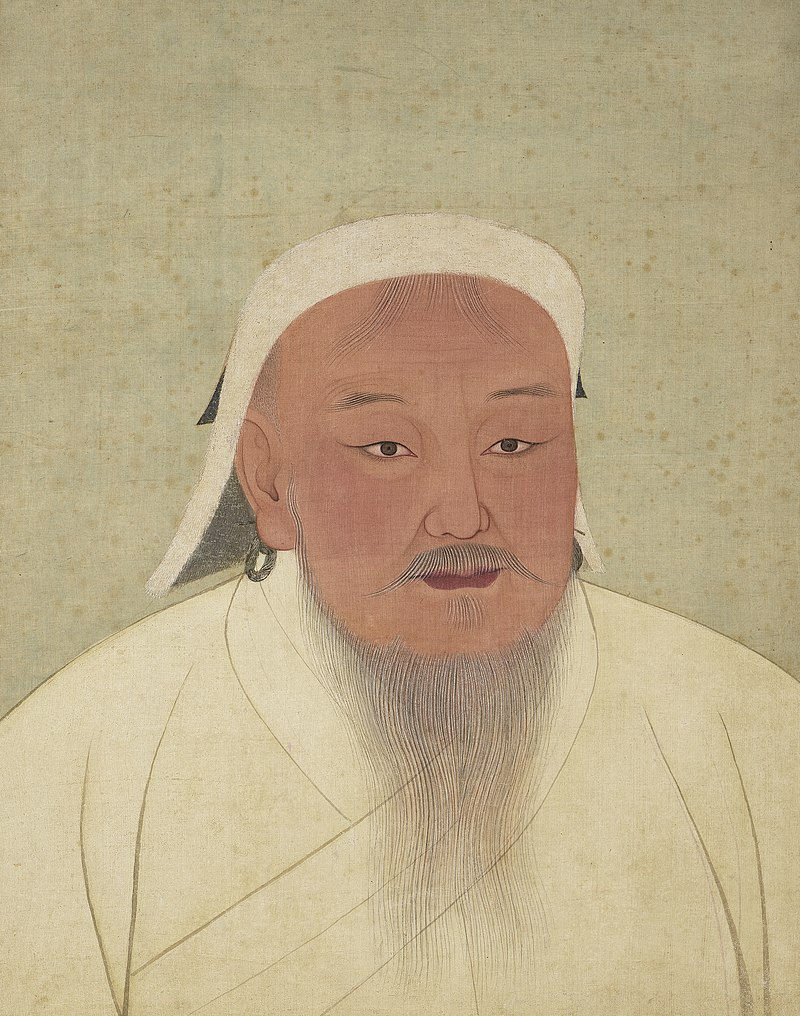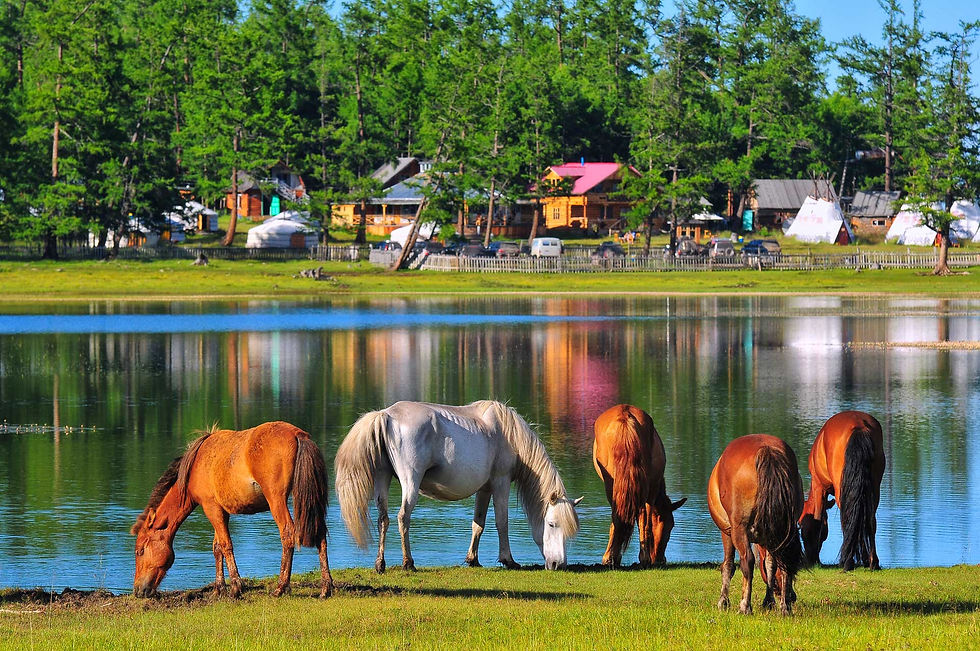Dschinghis Khan
- Enkhzaya Ganbold

- Mar 3, 2020
- 4 min read
Updated: Nov 3, 2023
A new version of Dschinghis Khan song.
Dschinghis Khan (known in some countries as Genghis Khan) is a German Euro disco-pop band. The band formed in Munich in 1979 to compete in the Eurovision Song Contest with their song "Dschinghis Khan".
The lyrics of Dschinghis Khan
Hu ha, hu ha Hu ha, hu ha Hu ha, hu ha Hu ha, hu ha Hu ha, hu ha Hu ha, hu ha Sie ritten um die Wette mit dem Steppenwind, tausend Mann (ha, hu, ha) Und einer ritt voran, dem folgten alle blind, Dschingis Khan (hu ha, hu ha) Die Hufe ihrer Pferde durchpeitschten den Sand Sie trugen Angst und Schrecken in jedes Land Und weder Blitz noch Donner hielt sie auf
Hu, ha, Dsching-Dsching-Dschingis Khan He Reiter, ho Reiter, he Reiter, immer weiter Dsching-Dsching-Dschingis Khan Auf Brüder Sauft Brüder Rauft Brüder Immer wieder Lasst noch Wodka holen, oh ho ho ho Denn wir sind Mongolen, ha ha ha ha Und der Teufel kriegt uns früh genug
Dsching-Dsching-Dschingis Khan He Reiter, ho Reiter, he Reiter, immer weiter Dsching-Dsching-Dschingis Khan He Männer, ho Männer, tanzt…
History of Dschingis Khan Band
English translation
Genghis Khan
They rode races with the steppe wind, thousand man And one rode ahead that all followed blindly, Genghis Khan The hooves of their horses rushed through the sand They carried fear and terror through every land And neither lightning nor thunder held them up
Geng-, Geng-, Genghis Khan Hey, riders - Ho, riders - Hey, riders - On and on! Geng-, Geng-, Genghis Khan Up, brothers! - Swill, brothers! - Scuffle, brothers! - Again and again! Send for vodka Because we're Mongols And the devil gets us soon enough!
Geng-, Geng-, Genghis Khan Hey, riders - Ho, riders - Hey, riders - On and on! Geng-, Geng-, Genghis Khan Hey, men - Ho, men - Dance, men - Like always! And one hears him laugh Always laughing louder And he empties the tankard in one swig
And every woman that he liked, he took into his tent It's said that there wasn't a woman in the world who didn't love him He fathered seven children in one night And merely laughed at his enemies Because no one could resist his power
Geng-, Geng-, Genghis Khan Hey, riders - Ho, riders - Hey, riders - On and on! Geng-, Geng-, Genghis Khan Up, brothers! - Swill, brothers! - Scuffle, brothers! - Again and again! Send for vodka Because we're Mongols And the devil gets us soon enough!
Geng-, Geng-, Genghis Khan Hey, riders - Ho, riders - Hey, riders - On and on! Geng-, Geng-, Genghis Khan Hey, men - Ho, men - Dance, men - Like always! And one hears him laugh Always laughing louder And he empties the tankard in one swig
Dschinghis Khan Touren
If you want to travel in Mongolia, you can check below links:
Genghis Khan - Chinggis Khan: The Unifier of the Mongolian Steppe and Architect of the World's Largest Empire

Genghis Khan, a name that resonates with the echoes of horse hooves thundering across the Eurasian plains, conjures images of a vast empire and a legacy that has shaped the course of history. Born as Temüjin in the harsh, unforgiving Mongolian steppe around 1162, he rose from the depths of tribal strife to become the founder of the largest contiguous land empire the world has ever seen.
The Rise of Temüjin
Temüjin's early life was marked by turmoil and survival against the odds. The future Khan faced adversity from his youth, including the abandonment by his tribal allies after his father's death. However, these challenges only forged his character, teaching him the vital lessons of trust, loyalty, and the importance of strong alliances.
The Birth of Genghis Khan
Through a combination of unyielding determination and political acumen, Temüjin united the fractious tribes of Northeast Asia. Upon achieving this monumental feat, he was proclaimed Genghis Khan, which translates to "universal ruler." This title was not merely honorary; it was a mandate that propelled him to embark on a series of military campaigns that would forever alter the geopolitical landscape of the world.
The Mongol Conquests
Genghis Khan's military genius lay in his ability to innovate and adapt. He revolutionized Mongol armies with superior tactics and a meritocratic approach, ensuring that the most capable, not just the most noble, led his forces. His campaigns were marked by swift cavalry charges, psychological warfare, and a network of spies that spread throughout the continent.
The Legacy of the Mongol Empire
The Mongol Empire under Genghis Khan did not merely conquer. It connected the East and West, facilitating a level of trade and cultural exchange that had been unprecedented. The Silk Road thrived under Mongol rule, and ideas, technologies, and goods flowed with greater ease than ever before.
The Death of a Conqueror and the Continuation of a Dynasty
Genghis Khan's death in 1227 did not spell the end of his empire. His descendants, most notably his grandson Kublai Khan, continued to expand and consolidate Mongol rule. The Yuan Dynasty in China, established by Kublai, was a testament to the Mongol's lasting influence.
The Dual Nature of Genghis Khan's Impact
Today, Genghis Khan is remembered as a complex figure. To some, he was a ruthless conqueror whose hordes left destruction in their wake. To others, he was a visionary leader who, through force, brought disparate cultures under a single administrative umbrella, fostering an era of trade and intellectual exchange.
Conclusion
The story of Genghis Khan is one of triumph and tragedy, innovation and devastation. It is a tale that serves as a powerful reminder of how a single life can change the course of history. As we reflect on his life and the empire he built, we are reminded of the indelible mark he left on the world — a legacy that continues to be studied, debated, and marveled at centuries later.































